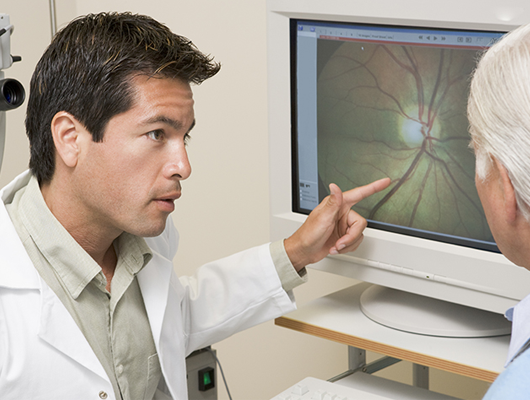Macular Degeneration
Age-related macular degeneration, often just referred to as macular degeneration, is a wearing away of the macula. The macula is the part of the retina that handles visual acuity, which means that vision can be negatively impacted with this condition. Dr. Jeff Jones, the ophthalmologist at Visionaire Eye Consultants in Castle Rock, and Littleton, Colorado, can diagnose and treat macular degeneration in its early stages. This may help save your vision.
Macular Degeneration Q & A

What is macular degeneration?
Macular degeneration is a condition that causes damage to the macula, the part of the eye that deals with visual acuity. Because the macula is primarily focused on central vision, problems with the macula can result in major vision issues. Patients with untreated macular degeneration may eventually lose their vision entirely. Age-related macular degeneration is by far the most common kind of macular degeneration, and it’s most often seen in patients who are 65 and over. There are two types of age related macular degeneration:
- Wet macular degeneration
- Dry macular degeneration
What is dry macular degeneration?
Dry macular degeneration is the most common type of age-related macular degeneration. It accounts for around 90% of macular degeneration cases. With dry macular degeneration, waste byproducts build up within the retina. This leads to serious vision problems.
What is wet macular degeneration?
Wet macular degeneration is the most serious type of age-related macular degeneration. In this kind of macular degeneration, the Bruch’s membrane within the eye starts to wear down. As this occurs, a series of very fragile new blood vessels grow. These delicate new blood vessels soon start to leak and bleed within the eye. This, in turn, results in scarring within the macula. Wet macular degeneration may eventually result in a complete loss of central vision.
What is the treatment for macular degeneration?
The treatment for macular degeneration is customized for the patient. At Visionaire Eye Consultants, Dr. Jones will perform a thorough examination to make an effective diagnosis before any treatment plan begins. While there isn’t a cure for this condition right now, a great deal of macular degeneration research is ongoing.
There are several prescription medications that can be useful in managing macular degeneration symptoms. Dr. Jones will work with each patients to determine which medications are best for their specific case of macular degeneration. For wet macular degeneration, treatment with highly specialized anti-VEGF medications such as Avastin or Eylea injected into the eye is highly effective at stopping the degenerative process and even improving vision.
Some specific vitamins and supplements may be helpful in dealing with macular degeneration. Vitamins that are full of antioxidants are quite effective, and zinc has also been found to be useful in the treatment of the condition. These vitamins and supplements are often able to delay symptom progression, even though they can’t stop the symptoms entirely.
